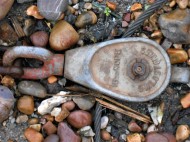The Delines – The Imperial

Beautiful Weariness
The seemingly hopeful exhortation for Charley to ‘cheer up’ in the album’s opening song is surely as empty as a recession-closed mini-mall car park? Is it remotely possible that this sad man has never heard the full story before?
Don’t believe it Charley; don’t imagine reality is ever other than narrated as it is.
Ill fortune and fortuity are far too persuasive in this real world for false hopes. No matter how good and positive things might have been, the bad cousin will visit and spoil it all, as in Imperial Apartment 315, a habitation for everyperson.
Sonny knew this. Sonny just disappeared. What is the point? How can there be a way out when a scene of sudden dislocation is accompanied by
A woman carrying a baby walks by
Next to me there’s an old couple
Whose car won’t start
And the snow keeps drifting down
In these opening three songs – Cheer Up Charley, The Imperial, Where Are You Sonny? – the horns of Cory Gray and Kelly Pratt fill the plaintive role normally supplied by pedal steel, though that is sure to come. This is exemplified further in the blues of fourth Let’s Be Us Again with its repeated yearning for a return to better times that cannot possibly be retrieved, despite the dreaming.
And once more, as with most Vlautin songs, this thematic certainty is reinforced in Roll Back My Life with such a melodic beauty that as listeners we somehow manage to keep our heads just above annihilation, the lyrics as spare and yet complete as always,
Roll back my life
Past all those years
Of just scraping by
And pour me a drink
Turn down the lights
And roll back my life
Roll back my life
So I can see where not to stall
I can see how not to fall
For those who I did fall
Roll back my life
In Eddie and Polly there is musical irony in its early 60s echo, a hint of the upbeat with the jingle of bells and a repeat chorus of can’t you see?, but in a storytelling that ends with such potent imagery as this is how the hurt become maimed we are in familiar territory, that pedal steel here now, it too ironic in ostensibly eschewing the lamentation.
It is wonderful to hear Amy Boone gracing the dark with her light, a vocal that speaks to the truth of each song’s narrative, not spoken but there are no lavish runs, and this clear-as-truly-felt delivery adds an authentic stoicism as well as tender understanding. Wonderful too that she has returned to performance from injuries sustained in a car accident.

One of the most dramatic of songs, musically speaking with its crescendo of determination, is That Old Haunted Place, a tale of failure and blame and the recurring theme of trying to move on from the inevitable, here a decision-making from someone who left home at sixteen who might just make it, away that is but likely not from the unavoidable to come.
Penultimate He Don’t Burn for Me is painfully simple and true, a soulful song of regret at the loss of love painted in the description of ordinary and everyday heartbreak. And oh those horns, swaying together in the melodic line to just about hold us all from falling, a final burst as the song finishes to massage as much as is humanly possible.
Closer Waiting on the Blue is the poetry of late night inevitability, the slow sad keyboard of Gray wrapped tight with Boon’s beautiful weariness, the horns like distant sirens called out to the painfulness.
This is another memorable album from Vlautin, Boone and fine band.















































